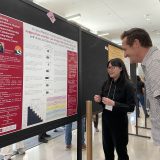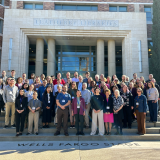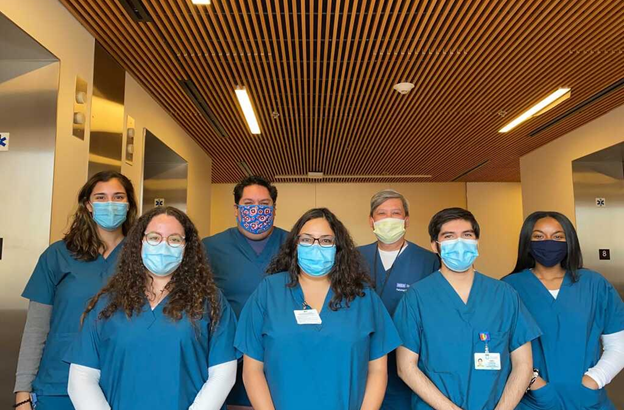
Working on the Front Line During the Pandemic Alumni Spotlight: Rosita Saul '20
July 12, 2021
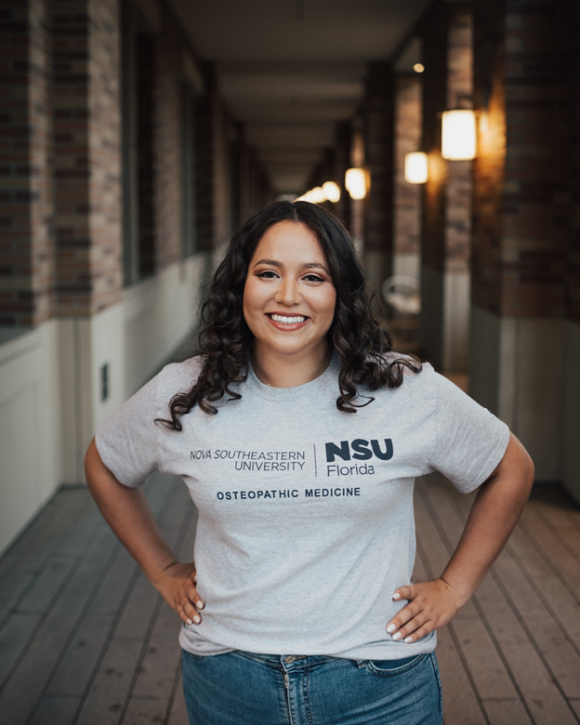 Rosita Saul ‘20 graduated with a B.S. in biological sciences and a minor in Holocaust history. During her time at Chapman, Saul was greatly involved around campus, where she was a member of the American Medical Student Association (AMSA), a child life volunteer at UCI Health, a volunteer at Higher Ground, a tutor at the Tutoring and Learning Center (TLT), a member of Schmid Student Leadership Council (SSLC), among others. She also was a Dean’s Scholarship recipient and a member of Beta Beta Beta Biological Honors Society.
Rosita Saul ‘20 graduated with a B.S. in biological sciences and a minor in Holocaust history. During her time at Chapman, Saul was greatly involved around campus, where she was a member of the American Medical Student Association (AMSA), a child life volunteer at UCI Health, a volunteer at Higher Ground, a tutor at the Tutoring and Learning Center (TLT), a member of Schmid Student Leadership Council (SSLC), among others. She also was a Dean’s Scholarship recipient and a member of Beta Beta Beta Biological Honors Society.
Hailing from Beverly Hills, Saul was able to attend Chapman without straying far from home. She currently works at the UCLA SwabSeq Testing Laboratory to test patient samples for COVID-19, and she recently has been accepted to Nova Southeastern University to continue her education.
We asked Saul questions about her time at Chapman, her career goals, and any advice she may have for current Schmid students!
Q&A with Rosita Saul:
Tell me about your career – what do you do on a day to day basis?
At the UCLA SwabSeq Testing Laboratory we receive anywhere from 500 to 4,000 patient samples to test for COVID-19. Our lab is unique in that we use Next Generation Sequencing to reduce heavy automation and make our testing platform highly scalable. We receive both nasal swab and saliva samples for testing that we plate and prepare to undergo PCR and once that’s complete, we move on to our library preparation step to sequence the samples. For the past couple of months, I’ve been working on our latest research project sequencing high positives for the California Department of Public Health (CDPH) to determine which variant strains they are, and which variants are present in California.
If you’d like to learn more about our testing process, check out the research article written by our lab!
Swab-Seq: A high-throughput platform for massively scaled up SARS-CoV-2 testing
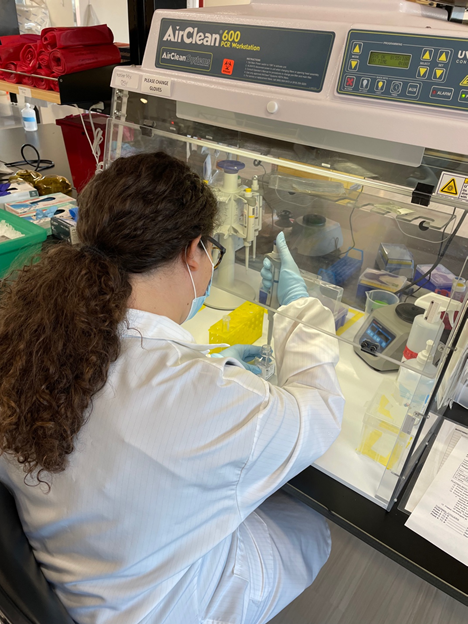
What led you to your current role?
I knew I would have a gap year following graduation as I applied to medical school and knew that I wanted to work in a clinical setting. As soon as I saw an opening at UCLA, I applied and was very excited to interview with Dr. Valerie Arboleda for a position in her laboratory. Not only was I excited to have an opportunity to gain more experience conducting clinical research, but I was also happy to contribute to the testing efforts to put an end to the COVID-19 pandemic.
How has your Chapman degree helped you?
My Chapman degree has been a great help to me this past year! There isn’t a day where techniques I learned from my various lab courses go unused. I’ve also been able to use my scientific knowledge learned throughout my coursework to better comprehend our testing process and how it all works.
What was a challenge you had as a student and how did you overcome it?
My biggest challenge as a student was having to retake Organic Chemistry. Prior to taking the course, I knew it would be challenging from what I heard from students and thought I would be prepared. I really struggled and began to go to SI sessions, but never changed the way I studied. Even though I spent hours and hours studying, it did not help, and I ended up retaking the course. I attended office hours, studied with classmates, went to SI sessions, and changed the way I studied to really learn and conceptualize the material. Having to retake Organic Chemistry made me a better student and taught me a lot about resilience. At first, I questioned if I was qualified to continue pursuing medicine, but ultimately decided that I could not let one class deter me from my passion. It was so important to me to help other students in similar situations and upon Dr. Ogba’s recommendation I was able to tutor for the course the following year.
What advice do you have for current students who want to make the most out of their time at Chapman?
I would advise current students to get involved and take on challenges! I would not have been able to participate in any of my involvements if I did not reach out to doctors, program directors, and even professors for opportunities that were available to me. It’s so important to explore all the different clubs and organizations that are on campus and find the ones that draw your interest. Most importantly, even if things don’t go quite as you planned or imagined, there’s always another path to take and someone that will be happy to help you. Stay resilient!
Which Schmid faculty member(s) made the greatest impact on you and how?
Dr. Rowland-Goldsmith has been an invaluable mentor to me since my first day at Chapman University. She served as my program advisor, and I consistently met with her to plan out which classes I would register for and which extracurricular activities I could participate in. Without Dr. Rowland-Goldsmith’s encouragement, I never would have thought of myself as having the qualifications to apply to summer REU programs. These programs truly piqued my interest in research and provided me with immense growth in my research skills.
Similarly, Dr. Schwartz served as one of my mentors, helping to review my summer REU applications and most importantly my medical school application this past year. I got to work alongside Dr. Schwartz, the Dean’s office, and faculty of the college in the Schmid Student Leadership Council where I was able to participate in meetings and events with a selected group of Schmid College undergraduate and graduate students to represent the student body. Being a part of this group, helped me develop my leadership skills and work better with a large team.
Last, but not least, Dr. Ogba certainly had a great impact on me with his endless help in my retaking of Organic Chemistry. He taught me several different ways to study the material, whether it be organizing like materials together or breaking a concept down. These are skills I used to prepare for my MCAT, and I am sure will continue to come in handy while studying in medical school.
How were you involved on campus during your time as a Chapman student? (clubs, organizations, etc.)
I was involved in a variety of different clubs at Chapman including AMSA, Global Medical Brigades, and Hillel. I so appreciate my time with each organization because I either met people I didn’t have classes with or had the opportunity to grow closer with those I already knew. I got to serve on the executive board for both Hillel and AMSA to coordinate events and help both executive board members and general members with their time at Chapman.
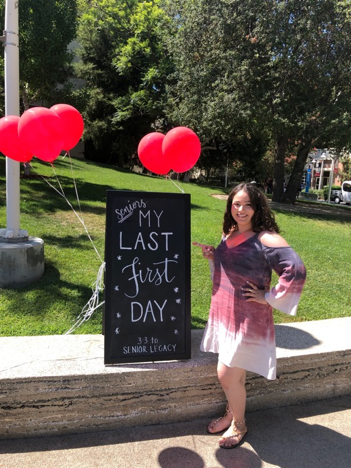
What is your favorite Chapman and/or Schmid memory?
My favorite Chapman memory is the first day of fall semester of senior year when all of us returned to school with excitement ready to finish our degrees. Everyone was lined up to take pictures with the “Last First Day of School” sign and I got to catch up with my friends I hadn’t seen over the summer. Although the Class of 2020’s senior year was cut short, this day was so special, and I will always treasure it!
What was your favorite spot on campus as a student?
I loved to study anywhere I could find a spot in Keck! All the whiteboard space was instrumental to studying whether it be for Organic Chemistry or Physiology. Sitting at the tables under the stairs or on the second floor by research labs in front of a whiteboard was where most of my studying got done.
Is there anything else you’d like to share with your Schmid and Chapman Family?
My biggest piece of advice would be to go to office hours and make connections with your professors. They are the most important members of your team to help guide you through your time at Chapman and your future endeavors.
Cover photo: Rosita Saul ’20 with her team at the UCLA SwabSeq Testing Laboratory.
